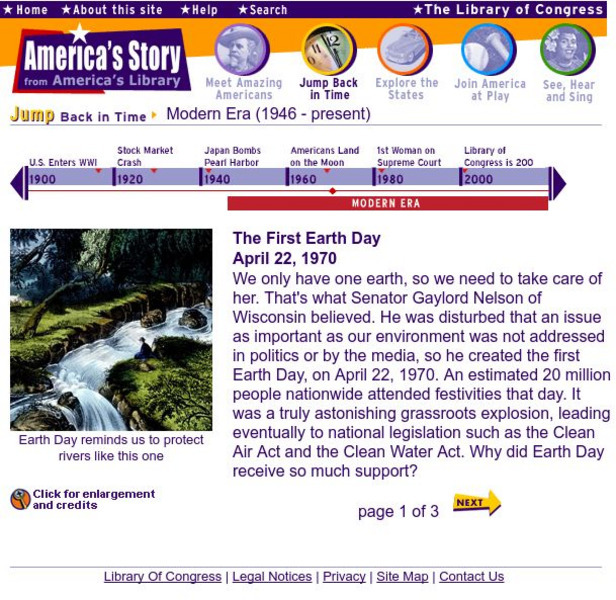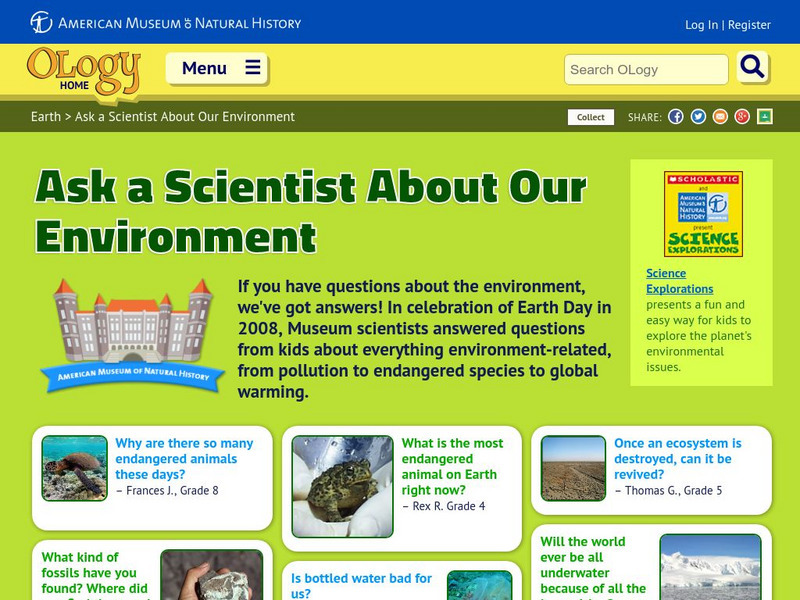Disney
Earth Day Guide to Being Green
Have fun completing Earth Day related activities while learning about simple ways to preserve the Earth. Implement some of the ideas for going green as a class, like cleaning up a local park or planting a tree at school.
PBS
What We Do Adds Up
With so many tons of trash going into landfills each year, your environmentalists can calculate how much the average person is tossing away. This activity has a series of questions not only requiring math, but a conscious thought of how...
It's About Time
Orbits and Effects
What does your world revolve around? Challenge the class as they learn about orbits and the effects of them on our modern world. Young astronomers begin by measuring ellipses and calculating the eccentricity of Earth's orbit. Then,...
Artisan Global
QuakeFeed Earthquake Map, Alerts and News
Amateur seismologists explore Earth's earthquakes in real time using a variety of map styles and parameter selections.
It's About Time
The Changing Geography of Your Community
Lead your class in exploring their local communities as well as the general environment. As they determine continental distributions by investigating minerals, rocks, and fossils located in their local region, pupils construct...
Curated OER
The Earth
In this earth fact worksheet, students look at a picture of the planet earth and read a list of accompanying facts, along with a brief paragraph.
Earth Day Network
Filtering Water
See the water filtration system up close with a fun science experiment. Young scientists work for several class periods to design a water filter using household objects, and then decide which filter material would be most effective...
Weber State University
The Sun and the Seasons
Why is there more daylight in June than in December if you live above the equator? How does the angle of sunlight shift throughout the year? Answer these questions and more with an interactive article about the sun, its path through the...
National Institute of Open Schooling
Occurrence and Extraction of Metals
Steel is a man-made alloy or a mixture of metals. Lesson 18 in this series of 36 focuses on metals and their extraction from Earth. Individuals read about, discuss, and answer questions after learning how people find most metals, the...
It's About Time
The Sun and Its Effects on Your Community
Why is the sun round? Examine this question, and others, with your pupils while teaching them how to live in a more earth-friendly environment. Pupils explore Sun composition and discuss how solar wind, sunspots, and solar energy affects...
Curated OER
Rocks and Minerals
Take young geologists on an exploration of the collection of rocks and minerals that we call Earth with an upper-elementary science lesson. Through a series of class discussion and hands-on investigations, students learn about the...
Laboratory for Atmospheric and Space Physics
Charting the Progress of New Horizons
In 2006, New Horizons began its mission to fly to Pluto. As it continues its journey, scholars track its progress with the help of an informative website, all the while reinforcing measurement concepts with the construction of a scaled...
Road to Grammar
100 Ice-Breaker Questions
What if you could ease your English language learners into class with engaging questions? You can do just that with these questions. The questions, designed to prepare learners for working with English, are grouped by topics, such...
It's About Time
Succession in Communities
What occurs following a natural disaster? High schoolers research this question and others as they investigate natural succession after a disaster. First, as they differentiate between primary and secondary succession, they explain...
It's About Time
Elements and Their Properties
How did ancient scientists classify elements? Answer this question and others as young chemists create a device to test the properties of various elements. They classify elements as metals or nonmetals, learn to differentiate...
PBS
Technology: Conveniences and Consequences
It's a delicate balance—using technology to improve our lives while still protecting the environment, and ourselves, from the hazards of technology use. Class members examine statistics about the increase in media use, complete a survey...
It's About Time
Renewable Energy Sources - Solar and Wind
There has been a huge solar energy spill! Let's go outside to play in it. This lesson includes multiple experiments showcasing solar and wind energies. Scholars build a solar heater and an anemometer before testing the results. The...
Penn Museum
Penn Museum: China Gallery
Invite your learners to take a closer look at the art and mathematical function of dome buildings as designed by the ancient Romans. In the next segment of this attractive activity set, your young historians will then learn about ancient...
Wilderness Classroom
Pollution
Educate scholars on pollution—air, water, and land—with a series of lessons that begin with a thorough explanation of each type. Learners then take part in three activities to reinforce the importance of reducing pollution. They...
Curated OER
The Planet Saturn
In this worksheet on the planet Saturn, students look at a picture of the planet and read accompanying facts, along with a brief paragraph.
Globio
Glossopedia: Earth Day
Earth Day is a worldwide celebration held annually on April 22nd. The purposes of Earth Day, the history of and the various activities held around the world are described. Activities and projects that can be done daily or year round are...
Library of Congress
Loc: America's Story: The First Earth Day
You would think that the environment has always been a priority but that's not the case. In 1970, a U.S. Senator was disturbed by the lack of concern for our environment and proposed the first Earth Day. Use this site to learn more from...
Other
Earth Day Canada: Eco Kids: Battery Facts
Battery Facts provides helpful information about the benefits of batteries, how they work, and the concerns over the footprint they leave on the environment when they are not properly disposed of.
American Museum of Natural History
American Museum of Natural History: O Logy: Ask a Scientist
A browsable collection of environment-related questions posed by elementary- and middle-school students to the scientists of the American Museum of Natural History in honor of Earth Day. Great questions and great answers.
Other popular searches
- Earth Day Activities
- Earth Day Writing Activities
- Earth Day Art
- Earth Day Art Project
- Earth Day Writing
- Earth Day Lesson Plans
- Earth Day Lessons
- Earth Day Games
- Earth Day Unit Plan
- Earth Day Participation
- Earth Day Word Search
- Letters for Earth Day

























